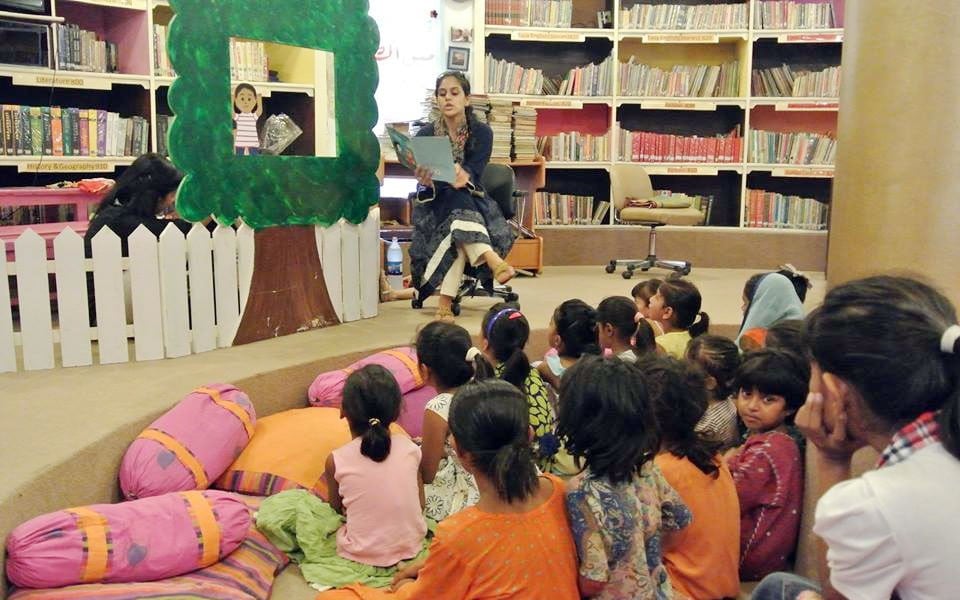
Alif Laila Book Bus Society has started community libraries

"I was in class 3 when I became a member of Alif Laila library," says Ateeqa, a 3rd year Arts student. "A few months back, I learnt that Alif Laila Book Bus Society (ALBBS) was helping to setup community libraries. I contacted them and they gave me 200 books -- mostly storybooks."
Ateeqa now tutors children after college at her home in PCSIR Phase II, 4km from Wapda Town. She loves children who she tells stories and engages in painting. These 8-10 junior school children who are her students, are the regular library users. Other children from the area also come once in a while to borrow books and all the children have always returned the books. The community library with Ateeqa is 2-3 months old.
Sobia, another library in-charge near F.C College, first became member of Alif Laila Book Bus Society when she was in class 6-7 in Government Bashir Memorial School at the back of Gaddafi Stadium. She would visit Alif Laila reference library with her school then. Sobia came to know about the community library project this year when she came for job to Alif Laila. She is a student of BCS, works with Alif Laila team now and also tutors children at home in the evening. To inculcate love of reading in her students, she holds storytelling sessions at her home.
Her library has 15 members, mostly children who come for tuition to her and are of all ages. Mothers also borrow books. "Children love to read books and always return them. I remember how we did not have access to a dictionary until Alif Laila reached out to us," she says.
The girls who benefited from the library as children are now only happy to promote it. There are five such community libraries in Lahore at present and they will only increase with time. Teachers who give home tuitions seem to be the best people to manage community libraries. Imagine a library in every mohalla, every child getting access to books.
"Our children need to know about people from other lands. Books let them know about others. Stories are the only way for children to go," says Basarat Midhat Kazim, President of ALBBS.
Alif Laila Book Bus Society has sent 100 boxes of 150 books each to Gilgit-Baltistan, I learn from her, also that the society has opened libraries in seven madrassas -- two for girls and five for boys with 200 books in each library. The racks in which books are kept at the madrassas have also been provided by the society.
The Alif Laila Book Bus Society is there since 1978 and has been reaching underprivileged children of government and small private schools that do not have libraries. "We have painted children’s corners in government libraries that have given them new life. The ALBBS has been trying to convince the government to make libraries in primary schools a part of their policy," says Vice President of the society, Rabia Khan.
Now there are 100 libraries in Multan and Muzaffargarh’s government primary schools set up by the ALBBS. This project was funded by USAID.
The Alif Laila rickshaw library reaches both government and private schools in narrow streets where its Story Teller bus can’t go, to give children access to books. "The books are issued to children for a week," the librarian on the rickshaw library, Faiza Shafiq tells TNS.
Apart from community libraries, another new project of ALBBS is ‘Pakistan Reading Project’. "We will soon be running four buses -- 2 in Sindh and 2 in Islamabad.
Completely committed to books and children, Basarat Kazim aims at setting up libraries and resource centres all over Pakistan. "We are reinvigorating the concept of libraries. Beauty and love must surround children because none of us are able to outstrip our childhood. Our children deserve the best -- they must be treated with respect and be surrounded with beautiful images. Books open new horizons. They take you places, mentally if not geographically," she says.
"What if there is poverty? There was a time when we had no money. Children would come here and donate books. Change in the society can only come from within. We can buy books by selling waste. We need will and will alone," Basarat Kazim goes on to say.